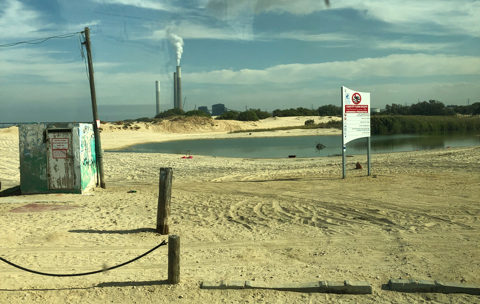Last week the British Government’s Science and Innovation Network in Israel joined a tour of the trans-boundary water hot-spots along the shared border of Gaza and Israel. The tour was run by EcoPeace, a Middle East organization that brings together Jordanian, Palestinian and Israeli environmentalists with the primary objective of promoting cooperative efforts to protect their shared environmental heritage.
We visited the Coastal Aquifer in the Israeli municipalities that surround the Gaza Strip, as this is a major water resource for both sides. We learnt about the dire humanitarian crisis in Gaza, and its implications for neighbouring communities in both Egypt and Israel. Around 97% of the natural water extracted from the Coastal Aquifer – the main source of water in Gaza – has been declared unfit for human consumption by WHO due to high salinity levels and contamination caused by release of untreated sewage. Lack of clean water for domestic use and unsafe sanitary conditions continue to pose a serious public health threat to the region.
Although most cross-border issues are complex, sensitive and difficult to resolve, EcoPeace reassures us that there is good news – that there are viable solutions that can resolve this cross-border issue. Along our tour we met with Alon Shuster, the mayor of the Israeli regional council of Sha’ar HaNegev, which is most severely affected by the crisis. He has initiated a movement to lobby government about the ensuing sewage issues to help search for long-term solutions to address the “health crisis that does not take into account political borders”.
It is by no coincidence that we were invited by EcoPeace to attend this sobering tour; EcoPeace is one of the grant recipient organisations of STREAM (Science, Technology & Research Exchange Across MENA), a SIN initiative supported by the British Council and BEIS (Department of Business, Energy and Industrial Strategy). The STREAM programme funds trilateral UK-Israel-MENA water research tackling some of the most crucial challenges in the Middle East North Africa region – just like this crisis along the Israel-Gaza border.
As EcoPeace guided us past pungent open sewage lakes and deceivingly stunning beaches that are in fact too toxic for swimming, they continually emphasised that the water crisis in the area is a national security risk, with most likely international consequences. SIN Israel will continue to search for ways to support and influence environmental developments in the MENA region, using the best of UK expertise.

